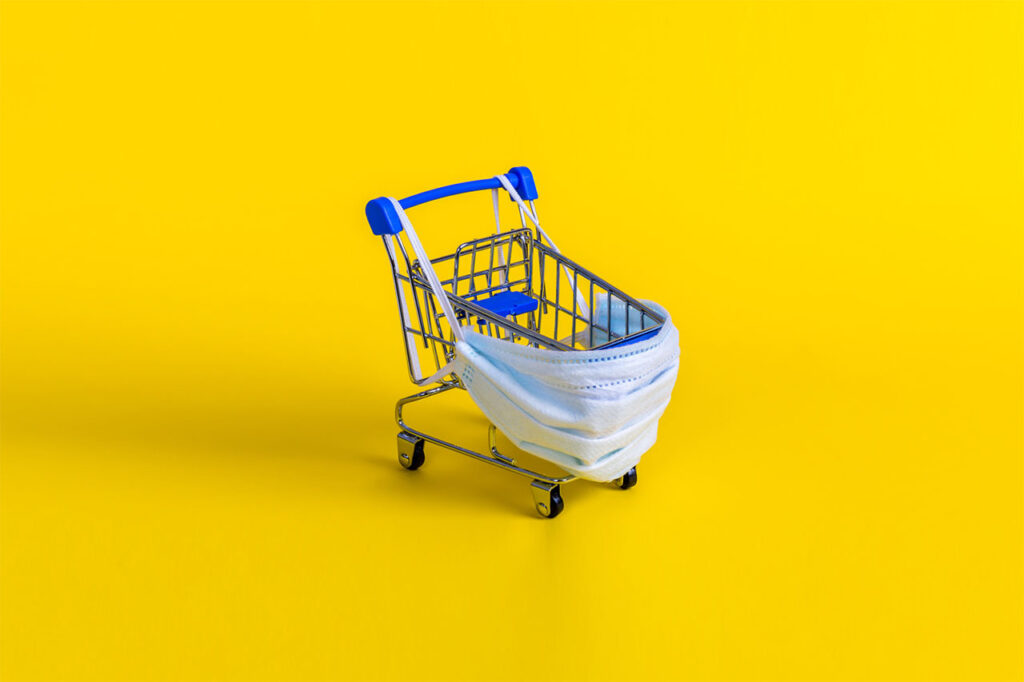Charlotte Gaston-Breton is an associate professor in marketing at ESCP Business School (Madrid campus), and the academic co-director of the Online Executive Master in International Business (EMIB). Her research in consumer behaviour focuses on positive experiences of consumption and cognitive biases in consumer decision-making.

Charlotte, what impact do you think the pandemic can have on people’s well-being?
Surrounded by the individual and collective threat created by the Covid-19, people may experience a myriad of emotions, most of them being negative by nature. Individuals come to discover their utter lack of control and emotions related to anxiousness, sadness or even anger may be felt.
Research in psychology has shown that such catastrophic events can create substantial emotional distress and negative long-term effects on an individual’s subjective well-being. But it is clear that not everybody is affected in the same way. It obviously depends on one’s personality and life experience, but also on how people regulate their negative feelings and emotions.
Can you give an example?
Imagine that Maya and Emile are two students in their last year at university. Although they do not feel at high risk of contracting the Coronavirus, they may experience episodes of anxiety, sadness or frustration because they are worried for their loved ones, they are confined alone at home, they socialize mostly online and are highly uncertain about their future in the workplace. They will both try to cope with those negative feelings but they may have radically different goals in doing so.
According to the theory of self-regulatory orientations formulated by Columbia University’s E. Tory Higgins, Maya may have a prevention goal (i.e., to feel better, she will avoid negative feelings) and will, in turn, be motivated by experiences allowing her to escape from reality.
Alternatively, Emile may have a promotion goal (i.e., to feel better, he will search for positive feelings) and he will be motivated by experiences allowing him to self-actualize.
“Individuals naturally tend to engage in different coping strategies, and mitigating negative feelings and emotions through consumption is one of them.”
How does this relate to consumption?
Research in consumer psychology shows that prevention-focused people like Maya are responsive to security needs and try to avoid mismatches with a desired state. Promotion-focused people like Emile are motivated by growth and development needs, and are concerned with approaching matches with a desire state. If the desired state is, for instance, to remain healthy during the pandemic, individuals with a prevention focus are likely to avoid eating fat foods (avoiding a mismatch) whereas individuals with a promotion focus are likely to exercise (approach a match).
Can consumption become a means to escape or to self-develop?
Individuals naturally tend to engage in different coping strategies, and mitigating negative feelings and emotions through consumption is one of them. This is the reason why the pandemic has induced new and sometimes irrational consumption patterns. Among them, for instance, panels from McKinsey, BCG, IRI or Nielsen report that consumers tend to spend less money but shop more frequently online, and that they tend to buy exclusively primary commodities except for hedonic product categories such as alcohol, skin care, makeup or entertainment. Those reports also show that even if the Covid-19 pandemic affects consumers differently, a majority of them believe the way they shop will fundamentally change after the pandemic.
How does this translate into shopping behaviours?
The distinction between people with a prevention focus and a promotion focus offers an interesting conceptual dichotomy to shed light on those unusual but probably long-lasting shopping behaviours induced by the pandemic. During lockdowns, prevention-focused consumers, like Maya in our previous example, are more likely to immerse themselves into alternative realities such as videos games, TV series or shows whereas promotion-focused consumers, like Emile, are more likely to express their creativity through digital paintings or develop their physical skills following sports tutorials.
Brands can provide positive experiences of consumption through their content strategy
Most of the positive episodes of consumption reported by prevention-focused consumers are, indeed, related to sensorial experiences (i.e., the temperature of a drink, the taste of a meal, etc.) and to technology-based entertainment (i.e., playing video games, watching shows, etc.). Those experiences allow people like Maya to escape self-awareness because they focus on on-going physical sensations or because they turn to imaginative escapes.
As for promotion-focused consumers, most of the positive episodes of consumption are related to health (e.g., following a diet, doing gym) and creativity (e.g., cooking, playing guitar). Many consumers, indeed, relate health to the construction of their ideal selves and creativity to the expression of their actual selves.
Are there implications for businesses?
If everyday consumer experiences can regulate negative feelings and emotions induced by the Covid-19 pandemic and consequently have an impact on consumer well-being, how can managers provide these positive experiences of consumption? This question should be addressed when developing a brand’s content strategy.
Traditionally, marketing managers distinguish content to educate (e.g., articles, guides, infographics), to persuade (e.g., checklists, ratings, financial calculations), to entertain (e.g., games, competitions, mobile apps) or to inspire (e.g., endorsements, testimonials, forum comments) so as to attract prospects, convert them into clients and retain them as loyal customers. Why not add a category we refer to as “content to enhance consumer well-being” and activate marketing campaigns that could either focus on “avoiding negative emotions” or “approaching positive emotions” accordingly?
This is not an invitation to engage in simple materialism or mindless overspending, which is neither a useful nor ethical path to well-being.”
How would this work?
With regard to prevention-focused content, brands could propose experiences of consumption to escape from the anxiety, sadness or anger felt and underline the calming benefits provided as well as the contribution to short-term and pleasure-based forms of happiness. By contrast, brands could decide to apply a promotion-focused content strategy and enhance the invigorating benefits provided by the experience of consumption, as well as the contribution to long-lasting and meaning-based forms of happiness.
Notably and importantly for both brand managers or consumers, this is not an invitation to engage in simple materialism or mindless overspending, which is neither a useful nor ethical path to well-being. Alternatively, we need to be aware of our usage of consumption in regulating our negative emotions, especially in the context of this stressful pandemic. Experiences of consumption can offer both a “dark side” of immediate relief and pleasure, but also a “light side” of long-lasting invigoration and meaning.
